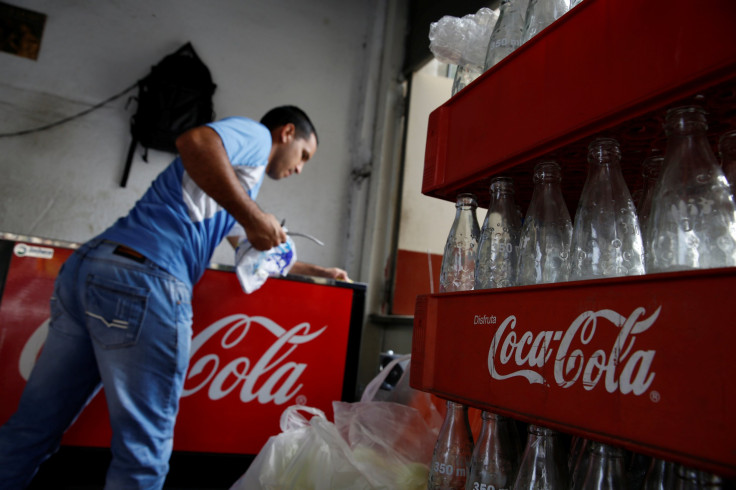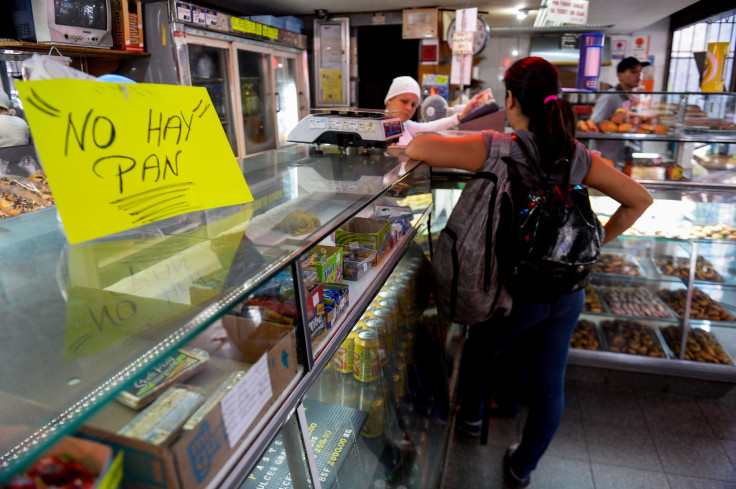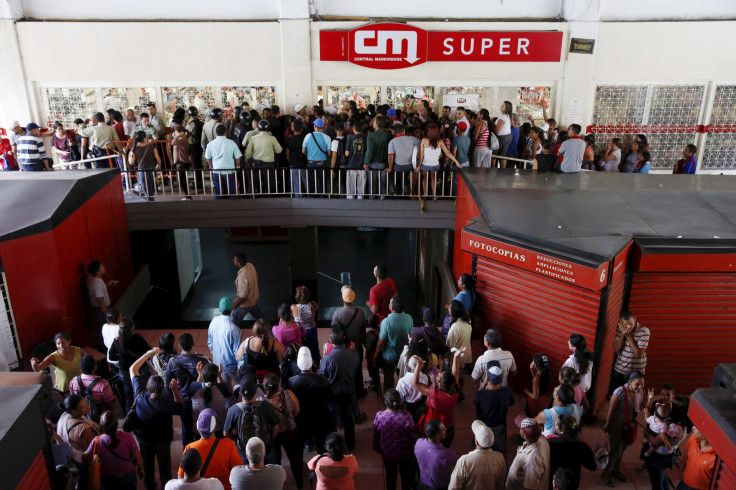Venezuela Crisis 2016: Coca-Cola Sugar Shortage Latest Blow To Big Companies Operating In Country On Brink Of Collapse

As Venezuela’s economy spins out of control, global companies are finding it nearly impossible to do business in the South American nation. A slate of multinational firms in recent months have stopped production or ceased operations as raw materials vanish and access to U.S. dollars shrinks.
Coca-Cola Co. this week became the latest corporate victim of Venezuela’s disintegrating economy after its Venezuelan bottler temporarily stopped production of sugar-sweetened beverages. Coca-Cola Femsa SAB said it ran out of sugar supplies at its four bottling plants due to a shortage in raw materials, Coca-Cola spokeswoman Kerry Tressler confirmed by email.
The soda shutdown came just a day after tire maker Bridgestone Americas said it was selling its business in Venezuela in response to runaway inflation and strict currency controls. Ford Motor Co., Procter & Gamble and oilfield services giants Halliburton Corp. and Schlumberger Corp. have all either slowed or abandoned investments in Venezuela amid the country’s worst downturn in 70 years.
“Production in Venezuela has on almost every front come to a complete stop,” said Dany Bahar, a Venezuela-born economist and fellow at the Brookings Institution in Washington. “All the private companies are struggling to import, and that’s why they’re not able to produce anything.”
Investment losses and falling earnings from Venezuelan operations are largely a blip on the balance sheets of multinational behemoths. But for Venezuela’s people, the cuts in manufacturing have resulted in thousands of layoffs at a time when inflation is soaring above 500 percent. Reduced production of basic goods, including pre-cooked cornmeal and cooking oil, is adding to broader shortages of food supplies and services such as electricity and medical care.
At grocery stores across the country, Venezuelans line up for hours to purchase basic staples, if any are available at all. People with foreign currency can purchase goods at enormous markups on the black market, but those with fewer resources have resorted to other survival strategies: Juan Gonzalez, a resident in Caracas, said he now eats cow lung, known as bofe, a food he once reserved only for his dog, the Guardian reported.
“All of these difficulties for multinationals to operate are creating a burden on the Venezuelan people,” Bahar said. “It adds to scarcity and it adds to a higher price in the black market. The ones who suffer from these are the poor.”
The government, for its part, has accused corporations of deliberately disrupting production and causing supply shortages to undermine state policies.

Venezuela has long been a difficult place for foreign and private companies to do business, particularly since President Hugo Chávez took office in 1999 and pledged to bring socialism into the 21st century. But existing challenges have been magnified in the last two years, since Chávez' death, by the plunge in oil prices, which has catapulted the struggling economy to the brink of collapse.
The South American nation, the world’s twelfth-largest oil producer, has grown increasingly dependent on oil exports under Chávez and his successor, President Nicolás Maduro, who took office in 2013. Crude sales now account for roughly 96 percent of the country’s exports, up from around 70 percent in the late 1990s.
Venezuela’s crude-dependent economy worked relatively well when prices were around $100 a barrel. The government subsidized everything from rice and milk to gasoline and hospital services as part of a broader mission to alleviate poverty and distribute resources among the lowest rungs of the socioeconomic ladder.
Higher oil prices helped prop up the bolívar, Venezuela's currency, which in turn spurred a consumption boom and expanded the market for multinational manufacturers, said Tony Spanakos, an associate professor of political science at Montclair State University in New Jersey who is co-editing a forthcoming academic journal on Chávez’s legacy.
“But that market really depended on intermediate and primary goods coming from neighboring countries,” he said. “In order to do that, you had to have access to dollars.”
The Venezuelan government controls access to U.S. dollars and doles them out via a stringent currency exchange. Many companies have said this system makes it hard to pay suppliers abroad, which in turn limits their access to imports such as sugar for soft drinks and malted barley for beer. Foreign firms also aren’t able to repatriate their profits, meaning that profits earned in Venezuela lose value with every uptick in inflation or devaluation of the bolívar.
The collapse in oil prices over the last two years has left Venezuela with far fewer dollars to distribute. With benchmark oil prices now down to around $50 a barrel — less than half their June 2014 high of $110 — foreign reserves in Venezuela have dropped to just a third of what they were in 2009.
To compensate, the Maduro government printed more bolívar notes, doubling the amount of cash in circulation or held in bank accounts and spurring triple-digit inflation. The black market exchange rate has soared in response. While the government pegs the official exchange rate at 6.3 bolívars per U.S. dollar, on the black market a greenback trades for more than 1,000 bolívars.

On top of currency problems, rolling power blackouts, stringent water rationing and crumbling infrastructure have made it harder to run factories and maintain operations. Foreign companies awaiting payments from state-owned enterprises — including Indian drug manufacturers and U.S. oilfield service contractors — have had to write off millions of dollars in losses.
Venezuela now sits above only South Sudan, Libya and Eritrea as the worst country in the world for doing business, the World Bank said in an October report on the business climates in 189 economies.
Still, the mounting challenges to Venezuela’s private sector are only one slice of a much graver social and economic crisis, Spanakos said.
The nation is grappling with a public health disaster as patient death rates climb at underfunded and poorly supplied hospitals, a New York Times investigation found earlier this month. Infant mortality is soaring, and essential cancer drugs and heart medicines have all but disappeared from pharmacy shelves. As the Zika virus spreads throughout the continent, Venezuela is losing the medical tools needed to prevent an epidemic, the Washington Post has reported.
“The effect on major multinationals is connected to a greater picture of economic collapse,” Spanakos said.
© Copyright IBTimes 2025. All rights reserved.





















